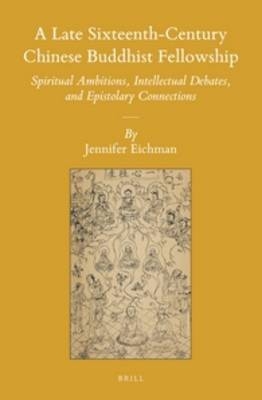
A Late Sixteenth-Century Chinese Buddhist Fellowship
Spiritual Ambitions, Intellectual Debates, and Epistolary Connections
Seiten
2016
Brill (Verlag)
978-90-04-30513-7 (ISBN)
Brill (Verlag)
978-90-04-30513-7 (ISBN)
Through a detailed analysis of epistolary writing, A Late Sixteenth-Century Chinese Buddhist Fellowship brings to life a lay disciple network associated with the monk Zhuhong (1535-1615) and his nemesis, the Yangming Confucian Zhou Rudeng 周汝登 (1547-1629).
Through a detailed analysis of epistolary writing, A Late Sixteenth-Century Chinese Buddhist Fellowship: Spiritual Ambitions, Intellectual Debates, and Epistolary Connections brings to life the Buddhist discourse of a network of lay disciples who debated the value of Chan versus Pure Land, sudden versus gradual enlightenment, adherence to Buddhist precepts, and animal welfare. By highlighting the differences between their mentor, the monk Zhuhong 袾宏 (1535-1615), and his nemesis, the Yangming Confucian Zhou Rudeng 周汝登 (1547-1629), this work confronts long-held scholarly views of Confucian dominance to conclude that many classically educated, elite men found Buddhist practices a far more attractive option. Their intellectual debates, self-cultivation practices, and interpersonal relations helped shape the contours of late sixteenth-century Buddhist culture.
Through a detailed analysis of epistolary writing, A Late Sixteenth-Century Chinese Buddhist Fellowship: Spiritual Ambitions, Intellectual Debates, and Epistolary Connections brings to life the Buddhist discourse of a network of lay disciples who debated the value of Chan versus Pure Land, sudden versus gradual enlightenment, adherence to Buddhist precepts, and animal welfare. By highlighting the differences between their mentor, the monk Zhuhong 袾宏 (1535-1615), and his nemesis, the Yangming Confucian Zhou Rudeng 周汝登 (1547-1629), this work confronts long-held scholarly views of Confucian dominance to conclude that many classically educated, elite men found Buddhist practices a far more attractive option. Their intellectual debates, self-cultivation practices, and interpersonal relations helped shape the contours of late sixteenth-century Buddhist culture.
Jennifer Eichman, Ph.D. (2005), Princeton University, is a Research Associate at the Centre of Buddhist Studies, SOAS, University of London. She has published on late Ming Chinese Buddhist traditions and the intersection of Confucian and Buddhist ideas.
| Erscheinungsdatum | 05.02.2016 |
|---|---|
| Reihe/Serie | Sinica Leidensia ; 127 |
| Verlagsort | Leiden |
| Sprache | englisch |
| Maße | 155 x 235 mm |
| Gewicht | 801 g |
| Themenwelt | Geisteswissenschaften ► Religion / Theologie ► Buddhismus |
| Geisteswissenschaften ► Religion / Theologie ► Weitere Religionen | |
| ISBN-10 | 90-04-30513-0 / 9004305130 |
| ISBN-13 | 978-90-04-30513-7 / 9789004305137 |
| Zustand | Neuware |
| Haben Sie eine Frage zum Produkt? |
Mehr entdecken
aus dem Bereich
aus dem Bereich
Philosophische Betrachtungen
Buch | Softcover (2024)
Aufbau TB (Verlag)
CHF 20,95
Unterweisungen in Zen-Meditation
Buch | Hardcover (2024)
Arkana (Verlag)
CHF 29,90


